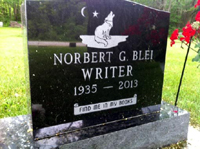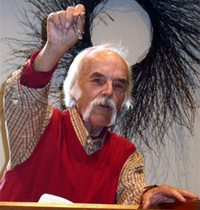
NOTES from the UNDERGROUND No. 199 | September 20, 2009
Addendum
to the Word Riot Interview, September 16, 2009
http://www.wordriot.org/template_3.php?ID=2055
by
Norbert Blei
Let me begin by thanking everybody who responded to this interview via e-mail or in the commentary section of the Word Riot interview conducted by writer David Hoenigman. I’m humbled, appreciative, encouraged by the community of readers and writers out there—of all ages. Which brings me to the reason for this addendum.
There’s a question that David Hoenigman asked me in the interview that continues to bother me because I feel I did not give it enough serious thought. My reply seems too quick, a little ‘smart-ass’ bordering on arrogant, though that was not my intention. I was caught up no doubt in the momentary rush of “MY answer”—dismissing, in a way, the source and sense of the Word Riot website for something different, distant, more esoteric. Thus my reply, ‘More foreign than American’, instead of a more perceptive answer for “new authors,” American perhaps, though I have no knowledge if the interviewer had this in mind. Nevertheless…David asked (and I replied):
DH: Are there any new authors that have grasped your interest?
NB: More foreign than American. And they are ‘new’ (most of them) only because I may have either recently discovered them—or finally gotten around to reading them.
As I study Word Riot’s engaging website more carefully, run through all the work and names of new, unknown writers (to me)…working/writing hard to be heard, I am reminded of my own long journey…how many little mags I submitted work to in the 60’s and 70’s, from mimeograph publications, to beautiful literary quarterlies. How I longed for a tidbit of recognition: “That was a good story you wrote.” How many early stories were rejected or occasionally accepted. Just how long this apprenticeship takes—or never ends. How many writers finally give up, drop out, start selling life insurance…settle for less, or something else. The whole process wears you down. Makes you angry. Bitter. Resigned. But you’re either a writer or you’re not. Only you and time can tell. Recognized, unrecognized. Success has nothing to do with it.
Writers are new and unknown. And just as many of them: older and unknown …forgotten… ‘successful’ (some of them) in that they may have established a good track record of publications through the years–books, articles, essays, stories, poems. But almost nobody knows their name. I try to be mindful of this with my own small press, mixing the new with the old … occasionally presenting ‘veteran’ writers such as the late Curt Johnson, his work, his dedication to the small press movement in America.
Though books by strangers arrive in my mail frequently, subscriptions to various little mags call for my attention, it’s clear I can no longer keep up with all the new writers, given the even wider distribution of work in our times: online writing, print-by-demand, YouTube. I can only look in awe at the whole process, catch hold of whatever drifts into my hands, before my eyes–often by pure chance. The same way Word Riot was passed on to me via a link by writer John Bennett—and an unknown writer (to me), David Hoenigman, wondered if I would write something, submit to a few questions.
That’s precisely the way the small press/little mag publication (now, online publishing) has always worked. That’s the lifeblood. The ‘underground’ circulation. Writers aware of each other—and spreading the word, if and when the spirit moves them. Of course there’s competition, jealousy, mean-spiritedness, maybe guilt…but there’s also generosity. People in the arts, especially, need to be reminded of this. It’s not always, just about ‘you’—but maybe that strange bird out there in Mississippi writing such real/raw/incredible stories, his sentences running on and on with no tolerance for punctuation, or that shy woman in Massachusetts, dressed all in white, knocking out those small, mystifying poems, stashing most of them in her dresser drawer till the day she dies.
I didn’t/don’t know David Hoenigman, who interviewed me, and still don’t. Though, because he asked something of me, I’ve since discovered a little here and there about him. He’s the ‘younger generation’ of that I’m sure. Probably ‘lost’—where every new generation of writers finds itself. Years galore no doubt separate David from me, though the beauty of the writing-life: this doesn’t matter. He lives ands writes from Japan, though how and why he (an American from Cleveland) landed there, I have not a clue. He has, to my knowledge, one book to his name so far. Not a book I know or have read—but will, eventually. And I’m going to BUY a copy—for his sake, a new writer.
You can learn more about David on two great websites/publications. The fact that he got some ink in Rain Taxi almost make me jealous. A superb publication. I’ve never appeared there—and wish now that I had tried. Time, time, time….
You’ll find an excellent interview concerning David and his work in Rain Taxi at http://www.raintaxi.com/online/2009spring/hoenigman.shtml

and can read an excerpt from his book, BURN YOUR BELONGINGS in Smoke Box at http://www.smokebox.net/archives/fiction/hoenigman606.html
Judging from the interview of him and the engaging excerpt from his book, I see and am reminded that David (and occasionally other new writers) seems taken with what we once called ‘experimental writing.’ Which I find a good and necessary thing. If you journeyed your way through writing-as-a-life with some success but never stopped to smell the roses of experimental writing—your education remains incomplete. It may be too late; then again, it may not.
While this remains a playing field for the young, for awhile…some of our ‘elders’ who stayed with it found such meaning and satisfaction there, they never left. But remained, sometimes confused, mumbling to themselves, their work perhaps unreadable/unread–or, turned over the soil so deep, reached new heights at such depths, blossomed in a way or a work or language exclusively their own. Let me throw out the name James Joyce. His one book which changed the course of modern literature.
But I’m getting carried away with the subject, with myself. Let me wrap this up.
For David, and other new, ‘experimental’ writers. I envy your interest and work in that area. I loved, and occasionally still practice it myself. It is a great teacher of narrative, of image, of patterns. It can open the mind like the breath of a fresh haiku.
However—-never think you have discovered anything new. It’s ALL been done before. From automatic writing to flash fiction to…you name it. Lit critics are as good as New York fashion folk in slapping new names to old concepts. Have you ever read Raymond Queneau? Jean-Francois Bory? Henri Michaux? Apollinaire? How concrete can writing get? kitasono katue’, Gerhard Ruhn, Carlo Belloli, ??? If you’ve never met Francis Ponge upon the page—you’re in for one hell of an introduction. He’ll steal your mind away. The diaries of Gombrowwicz will take you to places you cannot imagine. If essay is your calling: what’s a feuilleton (see Ludvik Vaculik) or a cronica (see Clarice Lispector)—which may be different names for things we already know, though conceived in different ways.
Bern Porter comes to mind too…once published by Something Else Press in the early 70’s—which was really something else. Both the press and the lively literary times. Find every Something Else Press book or pamphlet you can lay your hands on. Look up Dick Higgins sometime—boy, could he/did he set the table for a language feast. What else can a writer do and learn about us—experimenting with our everyday language of life?
No, you have not discovered something new. You are only fine-tuning the process but—with any luck, making it a little more your own. Which is no little thing.
Sooner or later, as I said before, it all comes back to story. Where it begins. If you lose that in the process of experimenting with words to make meaning, you’ve lost your reader and yourself.
ULYSSES is just an old, old story. Made different, anew, alive in the language of Joyce.





























































Art…this picture is sooo classic.. have never seen inside of coop,
but it has exceeded my wildest dreams.
Actually, it rather looks like my bedroom-office.
Well, I know where everything is.
Don’t you?
Dorothy
Your works on this site are so valuable. I just got through a tough part of shingles in my eye so I can now read and drive again. Keep up the great work. You are needed.